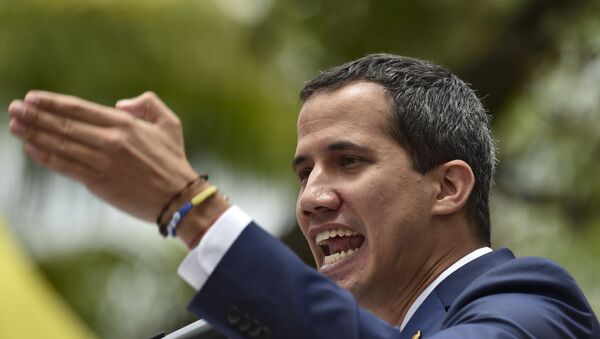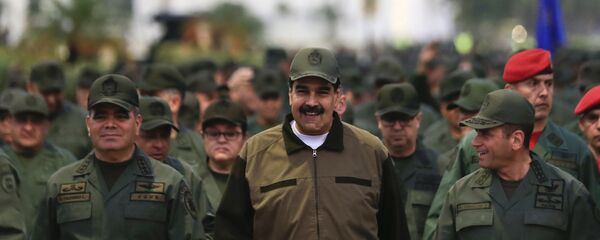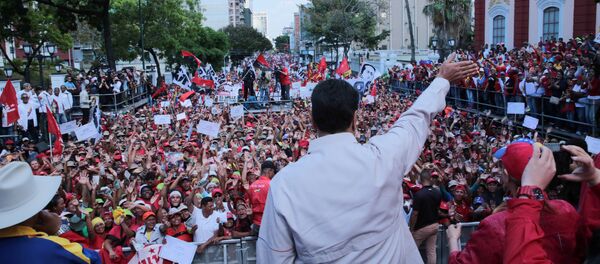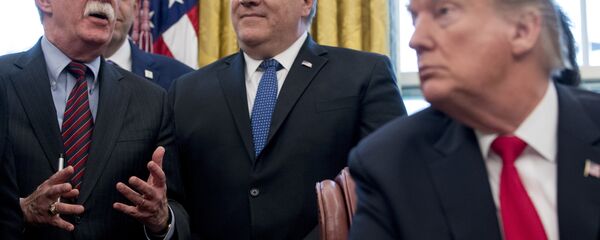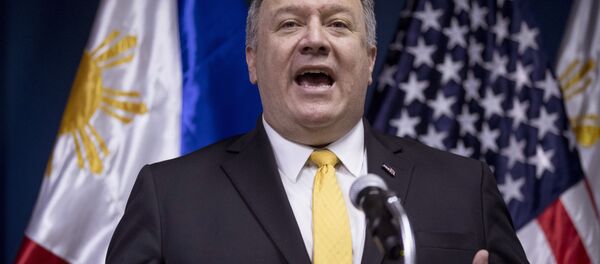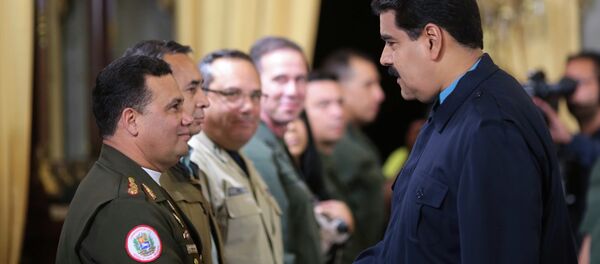Sputnik: What is happening now on the streets of Venezuela? Can these events be called a humanitarian crisis?
David Lopez Torres: The concept of "humanitarian crisis" has to do with emergency situations resulting from natural disasters or acute armed conflicts that put in a crisis situation the security of an entire population according to the UN. This is not the case in Venezuela.
It is possible to perceive in various international forums how the concept in question is distorted for political and military purposes, without taking humanitarian considerations into account. The ends are not very holistic and have an egocentric end. The "humanitarian crisis" as a political, social, economic, economic, cultural and media instrument only serves the interests of a very small number of people, being used as an unconventional instrument of war. In very rare cases, real humanitarian crises are treated at the expense of non- humanitarian interests. It is enough to refer to the serious humanitarian situation in the Republic of Colombia, where a strong reaction from the international community is still expected today.
Despite of all the difficulties mentioned, it can be seen that the Venezuelan people assume these consequences with a surprising, calm, conscious and mature organisation. Most services were restored after the computer sabotage that left the entire country without electricity. It has also been seen how people turned up on the streets to demonstrate against military intervention. Peacefully, the people have also expressed their support to the national government, encouraging it to continue with social policies such as the Great Mission Housing, the distribution of CLAP food, the promotion of education and health among others.
READ MORE: WATCH Venezuela Servicemen Burn Letter From Guaido
Sputnik: How true is Western media covering events in Venezuela?
David Lopez Torres: For the common people, ideology is the simplistic expression of the study of ideas. In a deeper evaluation, ideology is a disfiguration of reality. From that perspective, the media are the main ideological focuses that can exist today. Ideology is based on what we traditionally call clergy, education and the press. In the information provided by the spoken and written press about the Venezuelan case, there is a purely ideological background. Thus, the media are at the service of those who today wield world power to argue that Venezuela is experiencing a humanitarian crisis that must end regardless of the way. The objective is to control the country's natural wealth and its geostrategic position in the region.
The honourable North American professor, Noam Chomsky states in his studies that the objective of the media is to maintain control of society through macro-communication companies. Societies, for them, must be biased and distracted to the point of almost leading them to ignorance. Liberator Simón Bolívar said in his writings that we have been dominated more by ignorance than by force. Unfortunately, this theory is still valid. It is even interesting to see how people forget that when I was a child I always wondered what mom and dad could say. A habitus has been inculcated in society, as Bourdieu would say, to the point of inhibiting us from curiosity and then following a pattern of media behaviour where surely, a 6 year old child would question many things that today adults manipulated by the media do not ask. When it is not possible to impose force, it becomes necessary to control the thinking of the masses. That's what the Western media are for!
Venezuela is a very good case for answering these questions. Everything has been said in the big Western media about the country: that it is a narco-state, a dictatorship where people starve to death in the country, etc. But it is not said that despite the sanctions, the country's social investment has increased steadily in 2018, reaching 74.7% of the national budget. In the last 20 years, educational investment has contributed 20 times to social investment, health 25 times, housing 27 times, social development 17 times, culture and social communication 23 times and science and technology 38 times. Formal employment is sustained at 60% and there are already 4,530,901 pensioners, thus reaching 100% of the 2018 pension target, all adjusted to the minimum wage protected by law. Nor is there any mention of the neighbouring country, Colombia, which has disastrous human rights figures: more than 7 million internally displaced persons, more than 4700 children killed in the last 8 years in the department of Guajira due to thirst and famine, more than 500 social leaders murdered after the peace accords, the third most unequal country in the world, and so on. If this is not a humanitarian crisis and does not deserve effective media action, then let us turn off the lights and go to sleep.
David Lopez Torres: If we refer to the economy in the Fourth Republic, we can see that the dependence of the hydrocarbon sector, corruption and the crippled productive system already existed. It is another thing for the media to strive to spread the economic difficulties while completely ignoring their origin. Little is said about how people lived in the fourth republic: torture, arbitrary detentions and other human rights violations. Atrocities that were never dealt by the Organization of American States, much less by the United States. The foreign debt of the country at that time and the austerity prescriptions imposed by the International Monetary Fund led in the early 90's to lower salaries and make the family basket more expensive. When people went out to demonstrate, it was repressed by the government of Carlos Andrés Pérez, leaving more than 3'500 dead by then.
Currently, in Venezuela, we are witnessing a set of unconventional methods of warfare used in Libya, Syria and Ukraine. There is a harassment where the economic is obviously the most chaotic of all. The coercive measures imposed by the US, the EU, Switzerland, the Lima group and others have decreased exports, devalued the Bolivar due to the taxes imposed by illegal changes such as the parallel dollar. And of course imports of raw materials and inputs necessary to develop the national production process have been made impossible. Any legal or natural person has also been prevented from negotiating or receiving aid from third parties. The Trump government issued an executive order where negotiations on debt issued by the Venezuelan government and PDVSA are prohibited. These measures cause the South American country to face an undeclared conventional war economy. In such a way, any measure that the national government executes, such as wage increases and price regulation, will be boycotted and used as a lethal weapon against the people. It would be an explanation of why there are no clear improvements in the national economy.
READ MORE: Russian, Venezuelan Foreign Ministers Discuss Coup Attempt in Venezuela (VIDEO)
Sputnik: How much do US sanctions, especially those imposed on oil, affect the economic situation in Venezuela?
As has happened with Cuba for more than 50 years or as happened in Chile with Salvador Allende, Venezuela assumes serious criticisms and consequences for having an independent and different way of governing in Latin America. To this day, Venezuela assumes the fact that it cannot use the dollar as an international currency; it cannot negotiate any international transaction via the same currency. This creates a second foreign debt, since most debt contracts are within the legal jurisdiction of the United States. On the other hand, there have been fragmented cancellations of banking contracts with Citibank, Deutsche Bank, Novo Banco in addition to having other banks that refuse to receive funds from PDVSA.
In 2017, there have been boycotts against Venezuela in the purchase of medical supplies, notably with 300,000 doses of insulin paid in advance by the Venezuelan state. CitiBank refused to receive the funds that the South American country was depositing to pay for the importation of these medical doses. These were blocked in international ports. On the other hand, the Colombian laboratory BSN Medical prevented the arrival of a shipment of medicine used to combat malaria. This was under the order of the former president, Nobel Peace Prize winner, Juan Manuel Santos. Almost 40 million dollars in food, basic supplies and medicines have been blocked, adding 1'650 million dollars belonging to Venezuela illegally retained by the financial services company Euroclear. This is following with the sanctions decreed by the US Treasury Department. At the beginning of this year, let's remember that the Central Bank of England refused to return Venezuela's gold reserves calculated at 1'200 million dollars. This is also in compliance with US sanctions.
If you really want to help Venezuela, it is enough to lift the blockade. This would greatly alleviate the country's economic situation.
David Lopez Torres: The National Government has referred that Venezuela was the victim of a cyber-attack to the brain of the electrical system generating a Blackout on March 7 that resulted in a few hours. Immediately, came a second cyber-attack and other successive electromagnetic attacks that generated explosions in several electrical centres. In addition to this, there were several firearm attacks on electrical distribution yards. In other words, there were systematic electronic, electromagnetic and physical attacks to the system.
In this 21st century, countries can be victims of cyber-attacks at any time. So much so that immediately after the attack on Venezuela's National Electric System, USPresident Donald Trump signed an executive order to maximise the protection of his country's electric system by shielding it from cybernetic and electromagnetic attacks.
As far as Venezuela is concerned, the system is being restored in its entirety and in the meantime, there is a cargo management plan promoted by the Venezuelan national government. Now, how to make an effective defence system in Venezuela? Obviously, the electrical damage to the Guri hydroelectric plant, which provides 70% of the country's electricity, could have been more severe. Those who caused this damage by planning a minimum of 15 days of blackout did not achieve their objectives, as the government did not allow this to happen. The contingency plan promoted by the Venezuelan State worked and protected health centres avoiding important human damages.
The government reacted with a Cargo Management Plan that began on April 2, 2019. The plan seeks to stabilise the national electricity system, reducing working hours and impacting the country's productivity and daily life. The attack on the electrical system also accounts for important losses to the nation.
In the framework of cooperation with China and Russia, an electronic defence system is being planned. According to Oleg Syromolotov, Deputy Minister of Foreign Affairs of the Russian Federation, the people who perpetuated the cyber-attacks knew well the vulnerabilities and algorithms of the Venezuelan installation equipment. Thus, the Russian deputy minister completes by means of a very logical theory that it is a remote impact integrated in the control and motorisation systems of the main power distribution plants, in which equipment manufactured in a Western country is installed. In view of all this, Russia has stated to provide the necessary assistance required by the Venezuelan government.
READ MORE: US' Real Actions Contradict Verbal Crusade Over Venezuela 'Humanitarian Crisis'
Sputnik: Many cases, such as the self-immolation of fruit dealer Mohammed Bouazizi in Tunisia or the murder of the blogger Khaled Saeed in Egypt have triggered local mass protests. What is the possibility of such a development in Venezuela? Is Arab Spring scenario possible in Venezuela and its neighbouring countries?
Indeed, the Venezuelan opposition sought to experiment in 2014 and 2017 with the characteristics of "colour revolutions" similar to those that took place in Kiev between 2013 and 2014. The aim was to contribute to this unconventional war. The number of victims in the violent demonstrations that left more than 600 injured and 39 dead disgusted the population and failed to convince people of the illegality of the state regency. The financial, military and paramilitary influence from abroad was insufficient, so the overthrow of the Venezuelan government has been impossible. I believe that from that perspective the people of Venezuela have adopted a social conscience that day after day is becoming more like the one that the people of Cuba have had in more than 50 years of blockade.
On both sides of Nicaragua there seems to be a new attempt to change the government under the format of "revolution of colours". Let us remember that Nicaragua for its part has been intervened by the US on several occasions and that important geopolitical and geostrategic interests are at stake there. From my point of view, Insurgency 2.0 is part of a continuous operation of the resurrection of the Condor Plan.
As for Colombia, a country neighbouring Venezuela, I do not think it will experience a colour revolution for several reasons: the Colombian opposition is not pro-Western, it has no foreign military and financial support, they adopt a progressive line contrary to Sharp's theoretical principles and, as if that were not enough, the violence of the demonstrations is encouraged by the Colombian State and not by the demonstrators, massively violating the human rights of the people as a whole. If things get more serious in Colombia, the revolution will be totally different and I think it could be very violent, following more than 60 years of civil war.
Sputnik: The mainstream media is intensively covering Juan Guaidó, but very little is said about his political program. How competent is he as a politician? Which reforms can be carried out if he comes to power? In your opinion, which external or internal political forces support Guaidó? Who can benefit from him coming to power?
David Lopez Torres: I don't think Juan Guaido has a political project for the country or at least a socially holistic project for Venezuela. Just by seeing who supports Guaido in the media, we can conclude that there is a clear intention to create a parallel government in Venezuela that responds to Washington's interests. A non-existent parallel government, outside the standards of international law that has been falling and burning the self-proclaimed president for lack of total internal and external support. If Juan Guaido or any other US-backed candidate came to power, the important and recognised social achievements of the governments of Hugo Chavez and the current president of the republic, Nicolas Maduro, could be overthrown.
The question is: if he doesn't have a political project for Venezuela, what is Mr. Guaido looking for? I think that, looking at it from a psychological point of view, the individual is eager to get out of that conflict that is becoming uncontrollable. He is one more piece of ammunition, an agent placed by the instances of power managed by the most powerful countries in the world. By being all in the same line to administer what they can possibly plunder from Venezuela waiting for orders that compromise it? In addition to eradicating any vestige of socialist ideology that seeks structural change in countries and rejects interference. It is purely a class struggle.
To this, we cannot forget from outside the hands of the European Union, the OAS, paramilitary groups and drug trafficking supported by Álvaro Uribe Vélez and Iván Duque in Colombia, Mario Abdo Benítez in Paraguay, Sebastián Piñera in Chile, Mauricio Macri in Argentina and Jair Bolsonaro in Brazil. More discreetly, but increasingly present in the destabilising factor in Venezuela, we can even perceive the government of Lenin Moreno in Ecuador. Inside, there is a big division of the opposition that does not have a political project either and that does not support Guaido or the military intervention.
Guaido has lost so much strength that not even the IMF recognises him as interim president. The Venezuelan situation is slowly getting out of hand for Donald Trump, who faces presidential elections next year. With little popularity and the urgency of appropriating Venezuelan resources to argue his "good offices" as US president, I do not think he is going to stand idly. The soft coup d'etat continues and today more than ever.
David Lopez Torres: It is important to know what is meant by "democracy," in order to decipher what Mr. Almagro is looking for by saying that Venezuela must be "re-democratised. Since Hugo Chavez came to power, the Venezuelan worker and citizen were given powers to make important transformations in a society that was not taken into account in the IV Republic. From that society emerged a new constitution, a magna carta that the opposition spits out when it doesn't suit them and praises when it gives them powers and faculties.
Mr. Almagro has spoken on many occasions of changing the "regime". And the question is asked: to replace it with what? By the one that has more than 8 million internally displaced people, assassinated more than 500 social leaders in 2 years and has a narco-paramilitary infiltration into the spheres of power, author of the greatest massacres in Colombia and probably in Latin America? By the one who hunts down the witch all over the national territory and keeps silent about the facts of governments that violate human rights, which is what the government of Ecuador is currently doing? What about the serious violation of human rights commented against Julian Assange? For the government that has forgiven the debts of the President's relatives and indebted the country by promoting vulture funds, as is the case in Argentina? For the government that says that any Indian, black, socialist or any woman who fights for her rights, as is the case in Brazil, must be killed? For the one who has put in power at least five corrupt presidents, as is the case in Peru? For the one who, with the current constitution, resulting from one of the most murderous and darkest dictatorships in the Southern Cone, represses indigenous people and indignant citizens, as is the case in Chile? I name these countries because Mr. Almagro never talks about them and their serious human rights problems. He only speaks when there are governments that do not respond to the interests of the most powerful, of the richest and in this case of Venezuela.
If we want to help Venezuela to move forward and improve its situation, it is not necessary to change its governmental or political orientation. This is demonstrated by the comparative figures of the IV Republic and Venezuela, which emerged with Hugo Chavez and continues to be chaired by Nicolás Maduro. If we want to help Venezuela, we must lift unilateral coercive measures and ensure that the media no longer tell lies and misinformation, because the lies they promote and the indifference of the international community do more harm than any bomb or missile launched from a warplane.
Sputnik: As you know, during recent UN meeting, the US Vice President Mike Pence called for a formal recognition of Juan Guaidó as the rightful leader of Venezuela and also turned to the Venezuelan ambassador, Samuel Moncada Acosta, telling him, "You shouldn't be here." Why do US representatives indulge in such rhetoric? What is your opinion on the way the UN is trying to resolve the situation in Venezuela in general?
David Lopez Torres: It is normal for Mike Pence to ask for Guaido's recognition because he is one of the instruments he has at his disposal to appropriate and control Venezuela's wealth. Moreover, Pence has no choice because neither he, nor Bolton, nor Trump can command themselves. They have higher levels of the financial sector that command them and tell them they need them.
On the other hand, I believe that the UN and other international bodies easily close their eyes when it comes to the political, media and economic siege against Venezuela. High Commissioner Michelle Bachelet has not been behaving very well in Venezuela's affairs recently, totally ignoring the consequences of the blockade. She has not considered the report of Professor Alfred de Zayas who, in his capacity as special rapporteur, has been the only active rapporteur to visit Venezuela. Nor has she retained much interest in considering the structures of the Special Rapporteur's mandate against unilateral coercive measures and much less has she been independent with her mandate. I also have the impression, as in the case of Pence, Guaido and company, that they do not command themselves alone. Michelle Bachelet has also not been very good with the case of Ecuador and Jorge Glas, Rafael Correa and others. She did not insist at all on the humanitarian crisis in Colombia, ignoring the role of the paramilitaries in her last report. Unfortunately, the United Nations is not what it should be: a place of plurinational, multilateral encounter of solidarity with the peoples and with justice and truth for all cases of human rights.
The views expressed in this article are those of the speaker and do not necessarily reflect those of Sputnik.
David Lopez Torres was also an international observer in the last presidential elections in Venezuela held on 20 May 2018.
